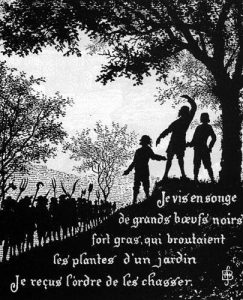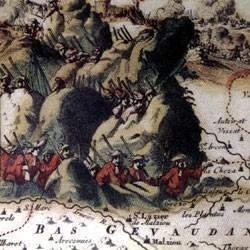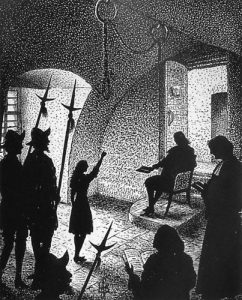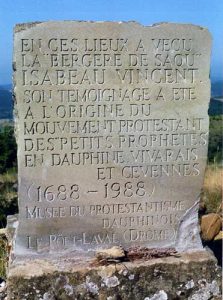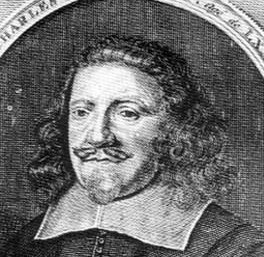The origins of the war of the Camisards
Abraham Mazel was the son of David Mazel (1648-1719), a wool comber, and of Jeanne Daudé (1650-1680). He was born on 5 September 1677, at Saint-Jean-du-Gard, also called Saint-Jean-de-Gardonnenque.
In October 1701, Abraham Mazel was visited by the « the spirit of prophesy » urging him to free his brothers imprisoned by Father du Chayla, archbishop of the Cévennes. He was called to wage sacred warfare against the persecutors.
On 24 July, 1702, Abraham Mazel, together with Esprit Séguier and a few others, led an action against Father du Chayla who had imprisoned young inspired men at the Pont-de-Monvert. The murder of the abbot triggered off the war – the King’s troops were attacked by small groups of armed rebels called “camisards” led by young prophets, such as Jean Cavalier or Pierre Laporte nicknamed Roland. They scoured the Cévennes and nearby plains, burning down churches while singing psalms.
A lasting struggle
In 1704, while Jean Cavalier was negotiating peace with field marshal de Villars, leader of the royal troops, others kept on fighting, and among them Abraham Mazel. In January 1705 he was arrested but spared thanks to the help of the parish priest of Saint Martin de Coronac whose life Mazel had formerly spared.
On 24 July, 1705, he escaped from the Tour de Constance (Gard) with seventy-six other prisoners.
With the guarantee that he would be taken to a foreign country, he surrendered and managed to join up with his friend Elie Marion. With his comrades he went to Geneva and Lausanne where he received an allowance as an officer in the “camisard regiment”. In November 1705 he took part in the attempted landing of the camisards and Savoyard partisans in Savoie. He sought refuge in England and participated in the « Cévennes prophets » group activities. He felt called to go back to the Cévennes, where he returned.
In March 1709 with Daniel Guy nicknamed “Billard” and Antoine Dupont, he went to the Vivarais region and formed a troop of young men led by Jean Justet de Vals.
On June 22 the camisards attacked the Swiss regiment de Courten but the latter withdrew without fighting. On July 8 they were defeated at Leyrisse, where Justet and probably Dupont were killed. The remainder of Mazel’s troops were dispersed at Font-Réal near Saint-Jean Chambre (Ardèche). Guy Billard was killed near Vors, but Mazel managed to escape once more. He took refuge in the Cévennes, met up with lay preachers who were still active, such as Claris, Corteiz and others. He then prepared another armed uprising.
On October 17, 1710, he was made prisoner and killed at the Mas deCouteau near Uzès (Gard).
A commemorative tablet was placed in the Reformed church in Uzès, a former Franciscan convent taken by the Reformed in 1791.
The site www.camisards.net is intended for as large a public as possible. It offers all types of documents and critical material, announcements of events and all the relevant available information relating to the War of the Camisards.

